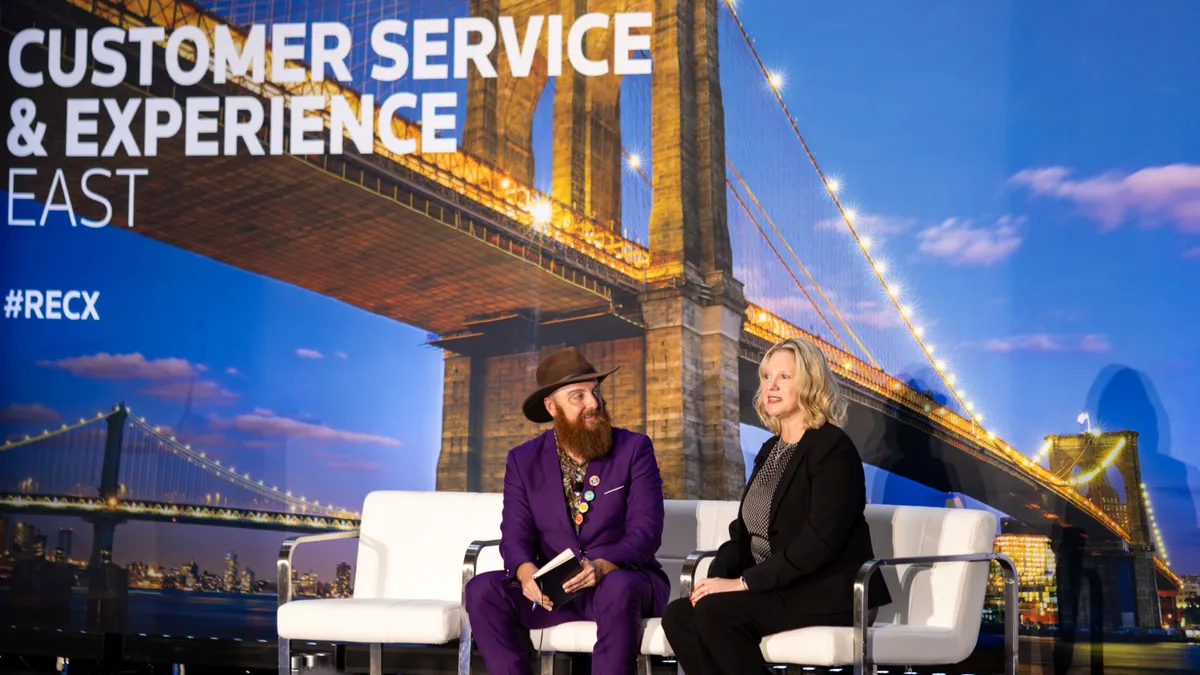Nordstrom’s overall sales continue to grow, and Heather Bissell thinks she knows the driver: customer experience.
The senior director of customer care at Nordstrom says what sets the retailer apart is human care. That doesn’t mean that Nordstrom isn’t investing in AI or technology, but it’s keeping humans in the forefront, Bissell said.
“The biggest thing for us is really about the human connection,” Bissell told CX Dive at the Reuters Customer Service and Experience East conference Tuesday in New York City.
AI can handle an aspect of personalized care, she said. “But when you really want the face-to-face, eye-to-eye, voice-to-voice connection, at Nordstrom, that is what we do really well, whether it is in the store, on the phone, chat, email, social media. Just across the board, it's about really making people feel special and validated.”
Sometimes it’s in the little things: after check out, staff will bring the bag around the counter or kneel when they bring you shoes to try on.
Other times, the dedication to personal care is eye-popping. The company doesn’t have an interactive voice response system, for example.
“If you contact Nordstrom, we don't have an IVR, so you're not going to press 1 for this press 2 for this, press 27 and three pound signs and then do the hokey pokey to get to an agent,” Bissell said during a panel Tuesday. “That is very intentional because we are very much a personal connection service company. That's what's rooted in our almost 125 year heritage.”
That may sound very old school in 2025, approaching 2026, Bissell acknowledges. The challenge, she told CX Dive, is balancing modernization with maintaining that human connection customers expect from the retailer.
Where Nordstrom is testing AI
Nordstrom isn’t putting its head in the sand when it comes to generative AI. The retailer is currently rolling out a proof of concept, using the technology to provide accurate delivery times during the holidays.
The key to rolling out AI is to determine a specific use case where the technology can meet a customer need, she said. In this case: package delivery, which is the No. 1 reason customers reach out to Nordstrom customer service. AI can handle many easy questions around package delivery, and when there’s a challenge, it taps in a human.
Bissell also stressed the importance of bringing along employees, the people using the technology.
“It's not just about implementing AI or implementing systems," she said. "It's about how do you get the employee buy-in? So how do you make people feel that comfort level and that trust?”
The company has sought to get employee buy-in for the proof of concept from the start. The proof of concept team has tapped five different variations of its frontline agent, including leads, training specialists and operational support specialists, to help design the hand off from AI to representatives.
“My team is ensuring that our frontline agents are a part of building what that handoff is going to look like,” she said.
Values come first
As useful as AI can be, humans and customers are central to the company’s ethos.
The retailer has five values: customer obsessed, owners at heart, curious and ever changing, here to win, and we extend ourselves.
Nordstrom trains customer care representatives on these values, not metrics. While Bissell says she looks at those metrics like handle time and shares them with executives, she doesn’t share it with front-line representatives.
“We don't even have [quality assurance] scores,” she said. “We have the values I mentioned earlier. We created a Nordstrom quality value program that our agents are trained on, and they're trained to have conversations with our customers based around those values, based around owning, being here to win.”
Leaders then listen to those conversations and have behavioral coaching conversations with representatives about what went well and what could improve.
It’s this dedication to personal, human care that keeps people coming back — and keeps folks coming up to her to offer their memories with Nordstrom, she says.
“What's really cool in the service industry, especially when I get letters from customers, is they talk about generations — ‘I remember going to Nordstrom when I was a child to visit Santa and to get my Easter dress with my grandmother, and now I am taking my own children to do that,’” she said.
Customer service is increasingly digital or nonhuman, especially at major retailers. But people still want that touch only humans can offer, Bissell argues.
“Especially in this day and age where things are changing so rapidly, people tend to gravitate towards that familiarization,” she said. “We want to be like family. We want to be your friends. We want you to feel safe. We want you to trust us. Again, it’s those human connections, building those bonds, knowing our customers through our loyalty programs.”























